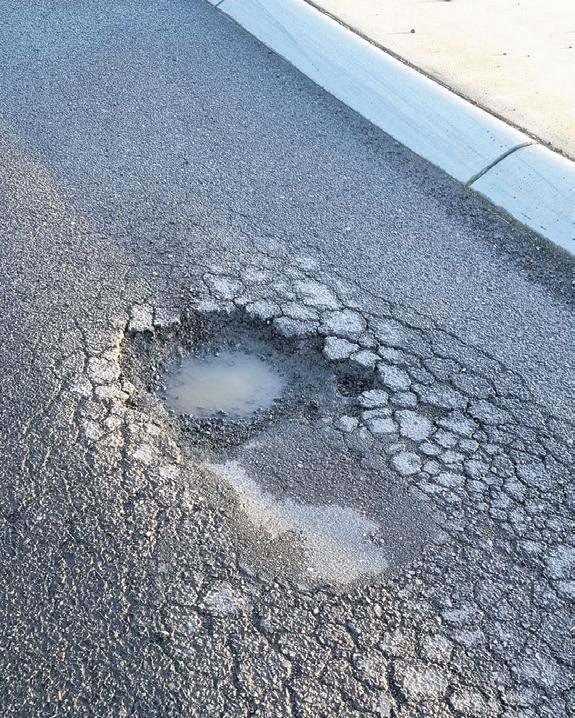
4 minute read
LOCAL HISTORY Recollections of a Visit to Port Phillip 1853-1855
William Dobie arrived in Port Phillip (Victoria) in March 1853 in poor health. He set off in a dog cart for a visit to a sheep station on the Loddon River the next month. He found no suitable business opening in Australia so returned to Scotland in 1855 and in 1858 became a merchant in Genoa. In poor health, he returned to Britain in 1864 to visit his mother in Exeter, where he died, and is buried in the Exeter General Cemetery.
Since the time of which I write, the Colony has had a strong reinforcement in the female line. Thanks to Mrs Chisholm among others for supplying the community with some ship-loads of needlewomen, whose accomplishments have already had their humanizing influences on the men of Melbourne and beyond.
Advertisement
It was with no feeling of regret that I found myself, seated in a dog cart, on my way into the bush. I had become tired of Melbourne life and looked forward to the change to bush life with considerable pleasure. My health being but indifferent, made the prospect of a quieter life most agreeable.
Our road lay in the thoroughfare between Melbourne, Forest Creek and the Bendigo diggings, to a sheep station on the River Loddon ... I had not much comfort in the vehicle in which I was seated, which swung back and forth on the uneven roads, like a ship in a cross sea. I was compelled to be constantly on the look-out, for if unprepared, a sudden lurch of the machine would have sent me spinning in to the middle of the road, an incident in travelling which it is generally desirable to avoid.
Before I got to my journey’s end, I had had enough of it. Every bone in my body ached and my hands, from holding on to the back of the dog-cart, were as blistered and sore as if I had been a fortnight at the diggings sinking a hole. I soon found, after many sighs, the comforts in a new country are few and far between. The man who cannot dispense with his comforts should wait a bit before putting his foot in Victoria and if he be a valetudinarian, let him not put his foot in it at all.
By the time I reached my destination,
An extract from the writings of William Wilson Dobie, Edinburgh, 1856.
Edited by Phyllis Boyd OAM
I had had more than enough of bush travelling on the back seat of a dog-cart, which on macadamised roads, would have been nothing remarkable, but was quite unadapted for the undulating tracks and roads of the bush. What a relief it was to get off for an hour or so at different stages. If I had been put upon a dog-cart as a punishment for crime, my conscience would have been easy on the score of expiation at the end of the journey.
A good pair of horses composed the tandem and my friend who held the reins was a good whip. So far fortunate, as steady horses and good driving are particularly essential to safety on such roads.
Some of our crossing places were ugly to look at, where the steep banks of a creek rising on each side ‘like lofty walls’, frequently presented themselves. To one unaccustomed to this style of road, they appeared almost unsurmountable, looking like sloughs of despond in the way of our progress.
The roads
Aportion of the road to Bendigo was then in a state of forwardness. Government labourers, at ten shillings a day, were breaking stones with what is called ‘the Government stroke’, which is a slow-going, anti-sweating kind of motion; or amusing themselves with a wheelbarrow and a spade, enjoying
The Dobie brothers
their pipes and looking forward to sundown, when the fatigues of the day would be over.
We frequently came to parts of the road where drays had either broken down or the horses or bullocks had knocked up from the difficulties to be encountered.
The whip was, in many instances, unmercifully applied and the poor brutes were rendered perfectly wild from their oft-renewed but ineffectual efforts and the curses and severities applied by the drivers. Innumerable decaying carcasses of horses and bullocks... saluted our nostrils as we passed, sometimes invisible to the eye, but to be smelt afar.
William Dobie was in Australia to visit his brother John, who had settled in Victoria in the 1840s and held large squatting stations with a Scottish friend, John Hunter Kerr. Dobie Creek near Ararat was named for him.
The brothers were born in Beith, Scotland, where their father James was a lawyer and also a widely recognised antiquarian.
A short while after his Australian trip, William Dobie went to Italy where he went into business as a merchant. He was on a visit to his mother, Margaret, who was temporarily living in Essex, England, when he died in 1864 at the age of 37.
John Dobie left Australia for South Africa in 1862 and became well known for his scribbles on South Africa.
The road to the diggings was thronged with travellers, some with drays, others with wives and families in light carts, while many more trudged thither on foot with their ‘swags’ on their backs, dusty, weary, foot-sore new chums, on their first trip to the diggings to realize their golden dreams or to join the too-general disappointment of their predecessors.
Our resting places for the night were at the wayside inns, at the most convenient distances for a day’s journey and at these, the accommodation for man and beast was what I can only characterize as wretched. If the traveller awoke in the morning after a good night’s rest, he might congratulate himself; but a slight inspection of the couch or stretcher allotted for his repose would require all his philosophy, unless his notions of cleanliness or undisturbed rest were by no means particular. Quiet during the night was not to be looked for, as the bar was open at all hours to all customers and every now and then a drunken shout would startle the halfasleep traveller and set him a-scratching again. The rooms in these greedy, filthy mannerless establishments had quite a stuck-up [makeshift] appearance, the public rooms having a dirty bandbox look, with a tawdry paper on the walls of so unsubstantial appearance that it was a strong temptation to knock one’s fist through the greasy partitions, on which were suspended one or two convict-looking pictures, who looked at you sneakily, as if they thought they knew that they had been sent across the seas on account of their ugly, thievish, murdering looks. Service at these places is one of those things that the traveller must dispense with as much as is possible. If he gets his boots brushed... he may consider himself as having received every attention.
At a place called Aitkens Gap where we rested the first night after leaving Melbourne, our sitting room was our










